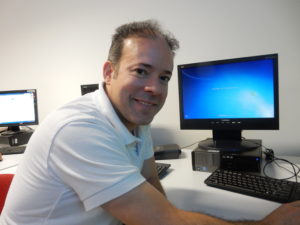A migrant’s flight from fear
Nelson Venturini’s journey to Australia began in 2009 when he was kidnapped by a criminal gang in his native Venezuela.
Driving home after work one day, his car was intercepted and blocked by an armed gang who abducted him and threatened to kill him.
The Telecom engineer was forced to hand over his car and empty his bank account before he was released.
 “I was in my car on my way home when it happened. There was a gang of gunmen – I don’t know who they were,” Nelson said.
“I was in my car on my way home when it happened. There was a gang of gunmen – I don’t know who they were,” Nelson said.
“They took me away and threatened to kill me unless I gave them all of the money I had. At the time I had been planning to get married so I had saved money to buy furniture and things for the house – but I lost it all,” he said.
“They took all my money and my car but after one night I was released.
“It was just one night but it marks you for your whole life.
“So I started to research migrating to different countries but I had to carry on with daily life and in the meantime my wife and I had two kids.
“Then in 2014 there were so many protests with people on the streets. People were complaining about the government but many of them were put in jail.
“I worked in a tall office building which had large windows so I could see how the police and army were treating people during the protests… it was very bad.
“I was just thinking about my kids and that was when I really decided I had to leave.
“There is a very difficult situation in my country. It so dangerous, so many people die every day and politically it has been very unstable,” Nelson said.
Venezuela has long been mired in corruption, military dictatorships and violent crime; and, since the 1980s, economic decline.
The most recent round of instability began in 1998 when Hugo Chavez was elected president amid disenchantment with established parties.
He launched the ‘Bolivarian Revolution’ that brought in a new constitution, socialist and populist economic and social policies funded by high oil prices, and increasingly vocal anti-US foreign policy.
In 2013, the inflation rate reached more than 50 per cent a year and the National Assembly gave President Maduro – who succeeded Chavez – emergency powers for a year prompting protests by opposition supporters.
Crime in Venezeula is endemic, with violent crimes such as murder and kidnapping often increasing annually.
A UN report attributed crime to the poor political and economic environment in the country, which has the second highest murder rate in the world.
Crime increased rapidly during the presidency of Chavez due to the institutional instability of his government.
By the time Chávez died in 2013, Venezuela was ranked the most insecure nation in the world by Gallup.
Crime has also continued to increase under President Maduro, who continued Chávez’s policies that had disrupted Venezuela’s socioeconomic status.
In 2015, crime, which was often the topic Venezuelans worried about the most according to polls, was the second largest concern behind only food shortages.
The majority of all crime in Venezuela remains unpunished according to Venezuela’s Prosecutor General’s Office, with 98 per cent of crimes in Venezuela not resulting in prosecution.
Nelson said he had no choice but to leave his homeland.
“I had a good position in a big company in Venezuela but the safety and future of my kids was more important and led to me to decide to leave,” he said.
“I researched many countries and found that Australia would be a good place to migrate to and Melbourne was a good place to come to in Australia.
“I had to work hard to get my visa. There were requirements around qualifications, experience and language.
“I could satisfy the qualifications and experience requirements but I had to work hard in my English language skills so I studied English for more than a year to prepare for the IELTS exam,” Nelson said.
He is now doing SPMP course with AMES Australia and looking for a job.
“I am looking forward to starting a new life in Australia,” Nelson said.
Laurie Nowell
AMES Australia Senior Journalist












